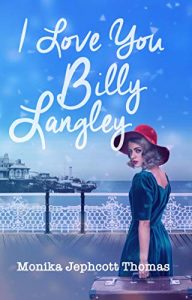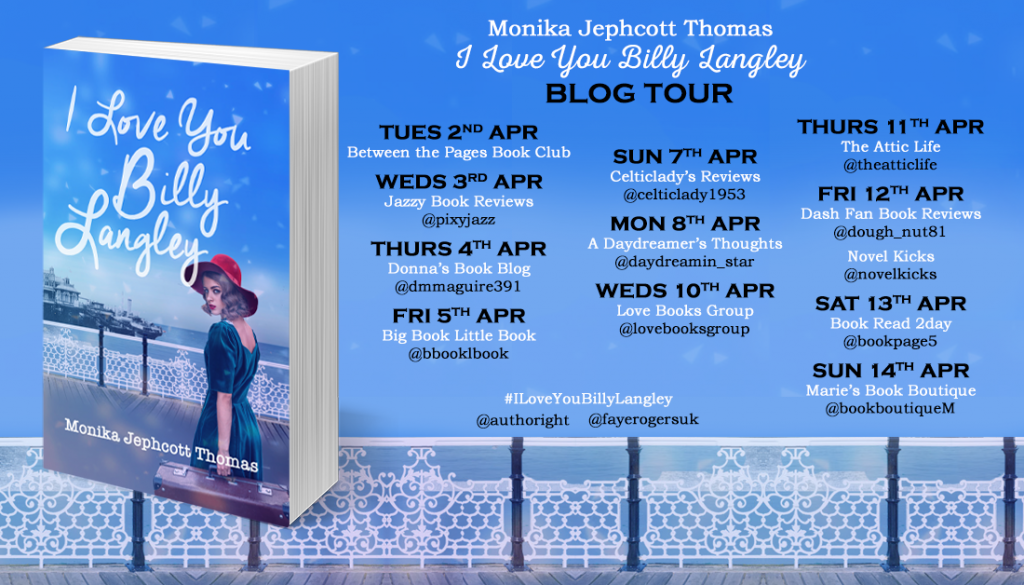
Author Interview: Monica Jephcott Thomas
Author Interview: Monica Jephcott Thomas
Today is my stop on the I Love You Billy Langley blog tour and I am pleased to welcome Monika Jephcott Thomas on to the blog with a quick interview! She’s come up with some intriguing answers!
Q&A
What is your favourite thing about writing books?
To get into a different world which is MINE and I am not disturbed in when I am in it.
Who is your favourite character in your book and why?
Rita is one of my favourites. In the book the protagonist Netta can’t wait to leave Germany, but her excitement and optimism soon come crashing down to earth when she tries to adjust to the huge differences in British life – from the grotesque gastronomic staples of mutton and lard to her struggles with the southern English slang which was never in her text books. However, a young English motormouth called Rita, comes to her rescue and the two form a strong bond. Rita is a ‘salt of the earth’ Southern English working class woman. She says exactly what’s on her mind and loves taking those that need it down a peg or two. But as well as being a sidekick to Netta, she has her own story in the novel, one that becomes quite dark at times, as she struggles to say what’s on her mind when it comes to her abusive boyfriend.
What is your favourite drink to consume while writing?
A Mango Lassi.
Do you have any bad habits while you’re writing?
Spending too long in my world and finding it difficult to get back to reality.
How do you research your books?
All my novels so far have been heavily based on my own experiences or those of my family, my parents in particular. We’ve all sorted through dusty boxes in attics full of photos of our parents in their salad days, letters they sent to each other, memories they shared, perhaps even secrets they kept. For those of us over forty those memories, no doubt, are often coloured by the Second World War. It was whilst doing just that in my own parents’ trove of memories that I discovered stories that were the thrilling, gripping, emotive stuff of novels, which is why I decided to turn them into one: Fifteen Words. A lot of the research for that book came from letters my parents had sent to each other, my mother’s diaries and tape recordings my father had made about his time in a Siberian labour camp. I also had lots of conversations with them while they were still alive about the extraordinary paths their lives took; the extraordinary paths that many people took and take in times of war.
I would also pore for hours over photos found in archives, on the internet and in my family’s own collections. Luckily, the age of photography was still reasonably young in the early-mid twentieth century, so the photos I saw could not have been doctored; and as such they are often the most honest and objective interpretation of the past we can find. Photos are so full of stuff to inspire your imagination; full of details that can populate your descriptions as a writer.
Private letters are similarly useful, as they can help you imagine the voices of your characters, the vocabulary they might use, the turns of phrase they might employ. Private letters often can tell us what kind of issues occupied the minds of people during the eras you are writing about. For example, nearly all of the letters in Fifteen Words are near transcriptions of genuine ones I found in archives. I would match a letter to the appropriate character, or sometimes a letter I stumbled across inspired a whole new turn of events in the book.
The diaries and letters of soldiers and of ordinary people who survived the air raids on Germany were very useful and made me realise that my parents’ experiences were in many ways universal.
For both The Watcher and I Love You, Billy Langley! I was able to mine my own experiences growing up in occupied Germany and then as a young teacher in England in the 60s to add to my methods of research
Are you a plotter or a pantser?
Well, in the case of this trilogy, I was generally a plotter, since I knew how the reality turned out on which I wanted to hang this novel. However, I think one always should be a pantser to a certain extent at least within the larger narrative arc. From scene to scene or chapter to chapter you should be open to allowing the characters to go their own way, make choices which have an impact on other characters, and turn corners which have an impact on their own stories. This is how it is for us in life – we never know where the road will take us – so I think this is how it should be in the most authentic writing.
If you could live in any fictional world, which would you choose and why?
I would not I like being myself.
If you could befriend any fictional character, who would you choose and why?
I would not want to. My real friends are more important to me.
About the book
 Twenty-year-old Netta can’t wait to leave Germany and teach in Brighton, England. It’s the height of the swinging 60s, but Netta hasn’t bargained for the prejudice she’ll receive in a country full of anti-German sentiment just twenty years after the war. She finds solace in Billy, the school caretaker, with whom she falls in love. But when she takes him back to Germany at Christmas it’s Billy’s turn to be on the receiving end of a frosty welcome.
Twenty-year-old Netta can’t wait to leave Germany and teach in Brighton, England. It’s the height of the swinging 60s, but Netta hasn’t bargained for the prejudice she’ll receive in a country full of anti-German sentiment just twenty years after the war. She finds solace in Billy, the school caretaker, with whom she falls in love. But when she takes him back to Germany at Christmas it’s Billy’s turn to be on the receiving end of a frosty welcome. About the Author
 Monika Jephcott Thomas grew up in Dortmund Mengede, north-west Germany. In 1966 she moved to the UK and, after a thirty-year career in education, delved into the therapeutic world where she has over twenty years experience as a counsellor and psychotherapist, gained with a wide variety of clients and presenting conditions.
Monika Jephcott Thomas grew up in Dortmund Mengede, north-west Germany. In 1966 she moved to the UK and, after a thirty-year career in education, delved into the therapeutic world where she has over twenty years experience as a counsellor and psychotherapist, gained with a wide variety of clients and presenting conditions.
By 1998, she and her partner Jeff established the Academy of Play & Child Psychotherapy (APAC). This has grown to become the largest provider world wide of post graduate training for Play Therapists and Practitioners in Therapeutic Play Skills, in partnership with several universities and colleges.
Monika and Jeff became founder members of Play Therapy UK. Monika was elected President of Play Therapy International in 2002. Their work culminated in the official recognition of the play therapy profession in 2013, an endorsement of their devotion to help the twenty per cent of children in the world who have emotional, behavioural, social and mental health problems by using play and the creative Arts.
Her professional background has given her insight into the effect of traumatic events not only on those directly experiencing them but also on their families and the generational impact.


